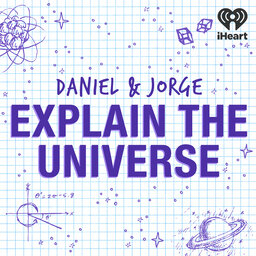What hidden symmetry is controlling the Universe?
Daniel and Jorge dive deep into quantum theory and explain gauge symmetry, the foundation of all modern physics.
Learn more about your ad-choices at https://www.iheartpodcastnetwork.com
See omnystudio.com/listener for privacy information.
In 1 playlist(s)
Daniel and Jorge Explain the Universe
A fun-filled discussion of the big, mind-blowing, unanswered questions about the Universe. In each e…Social links
Follow podcast
Recent clips

Fall equinox listener questions
19:36

Summer solstice listener questions
20:10

Spring equinox listener questions
20:41
 Daniel and Jorge Explain the Universe
Daniel and Jorge Explain the Universe